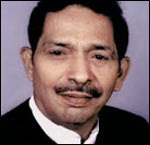Both his pair of school clothes – and he got only two pairs every year – would invariably have betel leaf-shaped patches on them. Trudging up and down hill tracts would see them get torn many times and so his mother would stitch those patches. “Now I make sure that all my clothes last at least 10 years!” says Bachi Singh Rawat. He adds, “On passing school, my father gifted me his wrist watch, which till date is my best prize and I still  have it.”
have it.”
Despite having donned the garb of the minister of state for defence, he has not made an increment of even a square yard in his father’s sparse farmland. But he is always aware of what grows on his two pieces of land in Thapla and Ranikhet. For he is in the farm most often to meet people when he visits home. He can be seen working on the land and even asks some visitors to put in a hand. He can barely stay in Delhi for than a month at a stretch. Then, he runs off to his native village for a clean hill breeze. After graduation, he studied law, during which he came under the strong influence of Jan Sangh, and later, via Janata Party, he came into BJP and became an MP in 1996. “My friends made in all these years fund my poll campaigns, which is why my expenses are so low. I don’t contest elections, my party comrades do.”
His monthly savings are Rs 40,000, but let that not startle you. “Our needs for my three-member family is just about Rs 20,000 a month, so the rest of my MP’s salary is saved, and I spend it on serving tea and snacks and paying for the travel expenses of the poorer people visiting him from his constituency.” As for the ADF, most of that is spent in upgrading schools in his locality.
Once he had been offered a big position and a fat purse to induce him to join Congress. “I told the person that my principles do not find echo in Congress party!”....Continue
 have it.”
have it.”Despite having donned the garb of the minister of state for defence, he has not made an increment of even a square yard in his father’s sparse farmland. But he is always aware of what grows on his two pieces of land in Thapla and Ranikhet. For he is in the farm most often to meet people when he visits home. He can be seen working on the land and even asks some visitors to put in a hand. He can barely stay in Delhi for than a month at a stretch. Then, he runs off to his native village for a clean hill breeze. After graduation, he studied law, during which he came under the strong influence of Jan Sangh, and later, via Janata Party, he came into BJP and became an MP in 1996. “My friends made in all these years fund my poll campaigns, which is why my expenses are so low. I don’t contest elections, my party comrades do.”
His monthly savings are Rs 40,000, but let that not startle you. “Our needs for my three-member family is just about Rs 20,000 a month, so the rest of my MP’s salary is saved, and I spend it on serving tea and snacks and paying for the travel expenses of the poorer people visiting him from his constituency.” As for the ADF, most of that is spent in upgrading schools in his locality.
Once he had been offered a big position and a fat purse to induce him to join Congress. “I told the person that my principles do not find echo in Congress party!”....Continue



